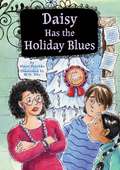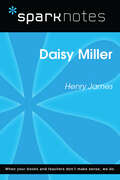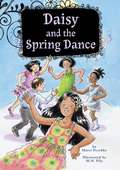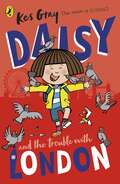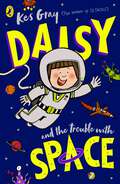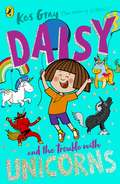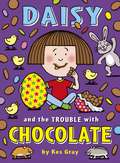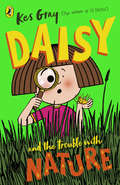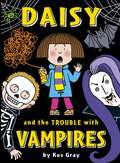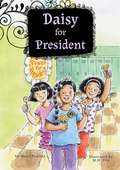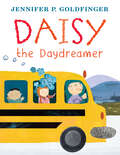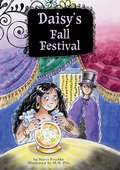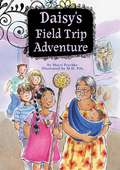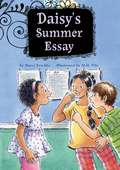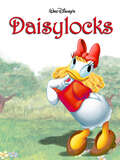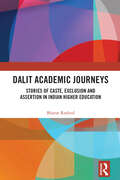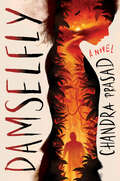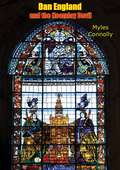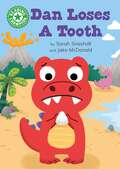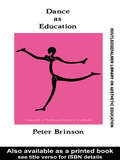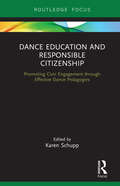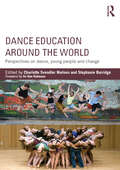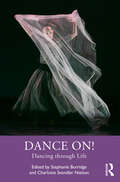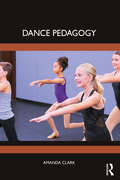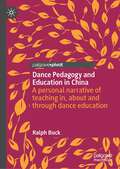- Table View
- List View
Daisy Has The Holiday Blues (Growing Up Daisy #5)
by Marci PeschkeNavidad is Daisy's favorite holiday. Daisy is on a mission to get everyone the perfect present. She's written a list and gathered her money. Just when she is ready to buy her presents, the Martinez family gets some bad news. The news and losing the class-door decorating contest gives Daisy the holiday blues! Will Christmas be ruined this year?
Daisy Miller (SparkNotes Literature Guide Series)
by SparkNotesDaisy Miller (SparkNotes Literature Guide) by Henry James Making the reading experience fun! Created by Harvard students for students everywhere, SparkNotes is a new breed of study guide: smarter, better, faster.Geared to what today's students need to know, SparkNotes provides:chapter-by-chapter analysis explanations of key themes, motifs, and symbols a review quiz and essay topics Lively and accessible, these guides are perfect for late-night studying and writing papers.
Daisy and the Spring Dance (Growing Up Daisy #6)
by Marci PeschkeWhen Daisy became student council president, she asked Principal Johnson to let the fourth grade hold a spring dance and he said yes! Now it's time to plan the dance and Daisy needs help. Blanca suggests holding a contest to pick the theme. The contest is a success, but will everyone come together to make it happen? Or will the Spring Dance be a major disaster? Grades 2-5.
Daisy and the Trouble With London (A Daisy Story #16)
by Kes GrayThe BRAND NEW laugh-out-loud Daisy adventure for readers of 6-9, from bestselling author of the Oi Frog series, Kes Gray.Here comes trouble!Daisy is off to actual, actual London for the day!!!Nanny and Grampy are taking her to see the Tower of London, Buckingham Palace, Big Ben and lots more.Trouble is, all Daisy really wants to see is Cooey the pigeon . . .
Daisy and the Trouble With Space (A Daisy Story #17)
by Kes GrayThe BRAND NEW laugh-out-loud new Daisy adventure, from bestselling author of the Oi Frog series, Kes Gray.Here comes trouble!Daisy and her class have SPACE FEVER after a talk about stars, moons and faraway planets. THEN their teacher announces they're going to spend a WHOLE WEEK learning all about space. How COSMIC is that?!Trouble is, SPACE FEVER follows Daisy back home too. And turning your bedroom ceiling into the universe isn't that easy. Even with lots of glow-in-the-dark stars, superglue, and your best friend to help . . .If you love this DAISY adventure, look out for more including DAISY AND THE TROUBLE WITH UNICORNS, DAISY AND THE TROUBLE WITH CHOCOLATE and DAISY AND THE TROUBLE WITH SCHOOL TRIPS!
Daisy and the Trouble With Unicorns (A Daisy Story #15)
by Kes GrayThe BRAND NEW laugh-out-loud Daisy adventure for readers of 6-9, from bestselling author of the Oi Frog series, Kes Gray.Here comes trouble!It's Gabby's birthday and Daisy is the GUEST OF HONOUR at her party!!!What's even more exciting is that Gabby has been given TWO TOY UNICORNS for her birthday.They're so sparkly and soft and fluffy and cuddly!!!Trouble is, these unicorns are also MAGIC - and very chatty. And they're giving Daisy all sorts of troublesome ideas...
Daisy and the Trouble with Chocolate (A Daisy Story #12)
by Kes GrayDaisy is SO excited! She's been picked to look after the class hamsters, Pickle and Pops, over the Easter holidays - AND her mum's taking her to Chocolate Land!!! Trouble is, the two things probably shouldn't mix...The totally troublesome and laugh-out-loud funny tale from the bestselling Daisy series.
Daisy and the Trouble with Nature (A Daisy Story #14)
by Kes GrayThe BRAND NEW laugh-out-loud new Daisy adventure, from bestselling author of the Oi Frog series, Kes Gray.Here comes trouble! Daisy and her class are so excited when their new school nature garden is unveiled. But the trouble with their nature garden is, there's not very much nature in it. There are NO:BirdsButterfliesGrizzly BearsWolverinesIf there's one thing Daisy HATES it's waiting. Especially waiting for nature to appear. Luckily, she's going camping with Gabby, and will find LOTS of nature to bring back.Only, the trouble with nature is, it's really hard to control...
Daisy and the Trouble with Vampires (A Daisy Story #11)
by Kes GrayIt’s Halloween and Daisy is going trick-or-treating for the very first time. In the dark . . . in the fog . . . with a VAMPIRE . . . armed only with a torch and some silly string. GULP!The funny, spooky and totally troublesome tale from the bestselling Daisy series.
Daisy for President (Growing Up Daisy #2)
by Marci Peschke4th graders Daisy and Madison both decide to run for class president. Madison is popular but not very nice, so Daisy's friends think Daisy will win. Daisy works very hard to campaign, but someone keeps messing up her posters!
Daisy the Daydreamer
by Jennifer P. GoldfingerDaisy&’s head is always in the clouds, but she still cares about things on the ground—she just needs to find her own way to prove it.No matter where she is or what she&’s doing, Daisy&’s imagination kicks in to make things more interesting. Her braids become fishing rods; the teeter totter launches her into space; the swings let her fly like a superhero. Most of the time, it&’s great fun. But sometimes it causes trouble. She folds the little brother she&’s supposed to be feeding and feeds the socks she should fold. Worst of all, Daisy longs to be line leader on a field trip to the aquarium, but the job is reserved for whoever can listen best to a lesson on octopuses. As hard as she tries, Daisy just can&’t keep the distracted clouds from rolling over her head.Still, Daisy is determined to show her teacher what she&’s learned, in a way that works for her—she can draw! Daisy pours her heart into an illustrated guide to the octopus, and earns her own special job, as the field trip&’s official artist. Brimming with Jennifer P. Goldfinger&’s humor and whimsy, Daisy the Daydreamer celebrates every child who yearns to be appreciated for who they are, not criticized for what they aren&’t. Daydreamers, doodlers, and free spirits alike will empathize with Daisy, and cheer her on as she becomes her own advocate.
Daisy's Fall Festival (Growing Up Daisy #4)
by Marci PeschkeIt's time for the Townsend Elementary Annual Fall Festival! Each class picks a theme, decorates their room, and entertains their friends and families while earning money for the school. Madison has declared room 210 will be having a bake sale, but Daisy doesn't think that idea will make their room very popular. Can Daisy convince the class her superstar idea will be fun for everyone? Grades 2-5.
Daisy's Field Trip Adventure (Growing Up Daisy #3)
by Marci PeschkeDaisy's 4th grade class is going on a field trip to see an Egypt exhibit. Daisy is nervous because her grandmother is coming along as a chaperone and Daisy is afraid all her classmates will laugh at her.
Daisy's Summer Essay (Growing Up Daisy #1)
by Marci Peschke10-year-old Daisy is excited to be starting 4th grade. It's great because her best friend is in her class and her teacher is fun. But when the teacher assigns an essay about summer vacation, Daisy isn't sure what to write about.
Daisylocks
by DISNEY BOOK GROUPDeep in the woods, in a pretty little cottage, lived Three Bears—Papa Bear, Mama Bear, and Baby Bear. On the other side of the forest lived a girl named Daisylocks. One morning, the Three Bears left for a stroll through the forest...and Daisylocks did, too! But as Daisylocks walks through the forest, she arrives at the Three Bears' home and decides to go inside! Don't miss this hilarious retelling of the classic story of Goldilocks and the Three Bears—with a Disney twist!
Dalit Academic Journeys: Stories of Caste, Exclusion and Assertion in Indian Higher Education
by Bharat RathodThis book provides a comprehensive overview of the academic journeys of Dalit students and their lived experiences of systemic exclusion in Indian higher education. It explains their educational journeys beyond caste-based discrimination, specifically analyzing the power dynamics, resilience, and resistance in their institutional life. The volume, — Describes institutional culture, practices and contexts that contribute to a negative environment for Dalit students, and what changes would be required to create a positive campus climate for them; — Provides a comparative analysis with the United States higher education contexts while drawing theoretical frameworks from critical race theory in educational settings, social reproduction theory and diversity research; — Discusses the significance of developing anti-casteist, democratic and inclusive university spaces in India, with an emphasis on how Indian university campuses can be transformed through diversity, equity, inclusion initiatives and indispensable support programs to assist Dalit and other vulnerable students; Nuanced and accessible, this book will be of interest to students, teachers and researchers of education, higher education, sociology, exclusion studies, and Dalit studies. It will also be useful for policymakers, social activists, NGOs, research centres and those working in the areas of higher education, reservations, public policy, caste, anti-caste and exclusion studies.
Damselfly: A Novel
by Chandra PrasadAfter crash-landing on a deserted tropical island, a group of private-school teens must rely on their wits and one another to survive. Their survival is in their own hands . . . Samantha Mishra opens her eyes and discovers she&’s alone and injured in the thick of a jungle. She has no idea where she is, or what happened to the plane taking her and the rest of the Drake Rosemont fencing team across the Pacific for a tournament. Once Sam connects with her best friend, Mel, and they find the others, they set up shelter and hope for rescue. But as the days pass, the teens realize they're on their own, stranded on an island with a mysterious presence that taunts and threatens them. Soon Sam and her companions discover they need to survive more than the jungle . . . they need to survive each other. This taut novel, with a setting evocative of Lord of the Flies, is by turns cinematic and intimate, and always thought-provoking. Praise for Damselfly &“Prasad&’s [YA] debut is a compelling modern-day adventure . . . An entertaining choice.&” —School Library Journal &“Ethics balance on a knife&’s edge as the characters make difficult choices and adapt to their new reality . . . A compulsive read.&” —Booklist &“Who are we when we are only accountable to ourselves? This bold, deft novel exposes how fragile the world we inhabit really is and what it might take for us to survive.&” —Neela Vaswani, co-author of Same Sun Here &“Prasad breathes fresh life into this fusion of Lost, Prep, Gossip Girl, and William Golding&’s classic.&” —Jake Halpern, author of Fame Junkies and Dormia
Dan England and the Noonday Devil
by Myles ConnollyA joyous gent who sings of the glory of the true realities of life, Dan England chose “talking” as his vocation in life. This he did, joyously and beautifully. He talked to the poets without dreams, actors who couldn’t act, and writers who couldn’t write who came to his house for an evening to listen and stayed on for months…years.Not a few found new hope as they heard him capture the poetry of living in his talk of saints, and in stories about his greatness of God’s gifts (among which was the wine that gave added sparkle to his words). There was Briggs, the religion editor without religion to become a fearless “defender of the faith” under Dan’s influence. And Tim, the janitor who “exposed” the corruption of the Match Industry when in an idle hour’s count of a box of matches he found “four” missing. For the glorious length of a Dan England discourse the retiring little janitor became a tiger for reform.This is the latest troubadour of life-beautiful to come from the pen of the author of the classic Mr. Blue.
Dan Loses a Tooth: Independent Reading Green 5 (Reading Champion #515)
by Sarah SnashallThis story is part of Reading Champion, a series carefully linked to book bands to encourage independent reading skills, developed with Dr Sue Bodman and Glen Franklin of UCL Institute of Education (IOE)Reading Champion offers independent reading books for children to practise and reinforce their developing reading skills.Fantastic, original stories are accompanied by engaging artwork and a reading activity. Each book has been carefully graded so that it can be matched to a child's reading ability, encouraging reading for pleasure.
Dance As Education: Towards A National Dance Culture (Falmer Press Library On Aesthetic Education Ser. #Vol. 5)
by Peter BrinsonFirst published in 1991. Routledge is an imprint of Taylor & Francis, an informa company.
Dance Education and Responsible Citizenship: Promoting Civic Engagement through Effective Dance Pedagogies
by Karen SchuppOriginally published as a special issue of the Journal of Dance Education, this collection brings together a number of insightful chapters which explore themes relating to responsible citizenship within dance education. Presenting research, scholarship, experiences, and pedagogical approaches from national and international contexts, and diverse educational settings, the chapters included in this book demonstrate how the study of dance requires students to develop a clear sense of self- and group-responsibility. Including high-level contributions from a range of researchers, educators, and dance instructors, the volume investigates how research and instruction can contribute to building communities; and ensure that dance education reacts to shifting social, political, and cultural norms. Responsible citizenship and civic engagement are examined in relation to course content, pedagogical approaches, systemic practices, and cultural assumptions. This valuable collection of diverse and insightful chapters will be of great interest to researchers, post-graduate academics, teachers and instructors in the fields of dance and teacher education.
Dance Education around the World: Perspectives on dance, young people and change
by Charlotte Svendler Nielsen Stephanie BurridgeDance has the power to change the lives of young people. It is a force in shaping identity, affirming culture and exploring heritage in an increasingly borderless world. Creative and empowering pedagogies are driving curriculum development worldwide where the movement of peoples and cultures generates new challenges and possibilities for dance education in multiple contexts. In Dance Education around the World: Perspectives on Dance, Young People and Change, writers across the globe come together to reflect, comment on and share their expertise and experiences. The settings are drawn from a spectrum of countries with contributions from Europe, the Americas, the Middle East, Asia, the Pacific and Africa giving insights and fresh perspectives into contrasting ideas, philosophies and approaches to dance education from Egypt to Ghana, Brazil to Finland, Jamaica to the Netherlands, the UK, USA, Australia, New Zealand and more. This volume offers chapters and narratives on: Curriculum developments worldwide Empowering communities through dance Embodiment and creativity in dance teaching Exploring and assessing learning in dance as artistic practice Imagined futures for dance education Reflection, evaluation, analysis and documentation are key to the evolving ecology of dance education and research involving individuals, communities and nations. Dance Education around the World: Perspectives on Dance, Young People and Change provides a great resource for dance educators, practitioners and researchers, and pushes for the furtherance of dance education around the world. Charlotte Svendler Nielsen is Assistant professor and head of educational studies at the Department of Nutrition, Exercise and Sports, research group Body, Learning and Identity, University of Copenhagen, Denmark. Stephanie Burridge lectures at Lasalle College of the Arts and Singapore Management University, and is the series editor for Routledge Celebrating Dance in Asia and the Pacific.
Dance On!: Dancing through Life
by Charlotte Svendler Nielsen Stephanie BurridgeBurridge and Svendler Nielsen bring together many perspectives from around the world on dancing experiences through life of senior artists and educators, whether as professionals working with community dance groups, in education or for recreation and well-being. Broadening our understanding of the burgeoning sector of maturing dances and dancers, this book incorporates a range of theoretical approaches with an emphasis on cultural and experiential dimensions. It includes examples of how artists, community practitioners, teachers, policy makers and academics work to better understand, promote and create new ways of thinking and working in the field of dance performance, education and well-being. Each section of the book includes a mixture of chapters based on research and case narratives focusing on practitioners’ experience, as well as conversations between world-renowned mature dance artists and choreographers. It features an eclectic mix of lived experiences, wisdom, deep knowledge and reflection. The book is a valuable resource for students of performing arts, pedagogy, choreography, community dance practice, social and cultural studies, aesthetics, interdisciplinary arts, dance therapy and more. Artists working across generations and in communities can also find useful inspiration for their continued dance practice.
Dance Pedagogy
by Amanda ClarkDance Pedagogy is a comprehensive resource designed for dance students and teaching artists to develop skills and strategies in the multifaceted practice of teaching dance.This invaluable resource features essential components and considerations necessary for the dance teacher in any setting, including the private and community sector, university setting, and professional venues. Five distinct units provide insight into the paradigm, learning process, class environment factors, planning, and delivery of the dance class in a broad context through the use of examples within the dance forms of ballet, jazz, modern, tap, and hip-hop. Readers intently explore cognitive and motor learning, strategies for developing curricula and lesson plans, and methods of delivering material to students. Basic principles of anatomy, understanding student behavior and participation, the importance of diversity, equity, inclusion and accessibility (IDEA), music concepts for the dancer, injury prevention, and classroom management are included to provide a well-rounded approach to the many challenges faced in the classroom.Dance Pedagogy provides the most holistic approach available in the art of teaching dance and is a core textbook for academic courses related to Dance Teaching Methods as well as an invaluable handbook for practicing dance teachers.
Dance Pedagogy and Education in China: A personal narrative of teaching in, about and through dance education
by Ralph BuckThis pivot offers an innovative approach to dance education, bringing a creative and inclusive dance education pedagogy into Chinese dance classrooms. Associate Professor Ralph Buck’s experiences of teaching dance at the Beijing Dance Academy and the possible implications for dance education in China lie at the heart of this text. Through a critical examination of personal teaching practice, pedagogical issues, trends and rationales for dance education in the curriculum are highlighted. Informed by constructivist ideals that recognise dialogue and interaction, this pivot suggests that dance can be re-positioned and valued within educational contexts when pedagogical strategies and objectives are framed in terms of teaching and learning in, about and through dance education.
